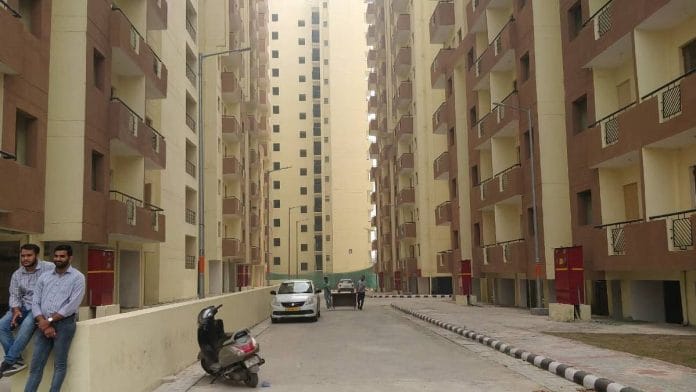New Delhi: Close to a year after the Delhi Development Authority (DDA) handed over 3,024 flats constructed for the economically weaker sections at Kalkaji Extension as part of a slum rehabilitation project, it is exploring options to “educate” the residents here in “basic civic awareness”, senior DDA officials told ThePrint. This includes ways of “proper disposal of waste and its segregation at source”, as well as the need for schooling of children living in these flats.
“They [the residents] need a bit of a nudge, or hand-holding, to ensure that they adapt to the new living conditions. For this, they need to be healthy, educated and skilled,” a senior DDA official said, adding that the DDA is considering roping in an NGO to engage with the residents.
There has to be a psychological and cultural transition along with the physical transition of residents, the official pointed out.
“Since the DDA is unable to ensure the holistic socio-economic development that it seeks to achieve, that’s where an NGO is required,” he added.
“The residents need to be taught basic civic awareness, which would involve segregation of waste at source, and other basic things such as ensuring that they send their children to school. Only then can we say that the residents have been rehabilitated in entirety,” the senior official told ThePrint, adding that the DDA was actively looking to sign a memorandum of understanding (MoU) with an NGO to help achieve this.
The initiative has, however, attracted some criticism from social workers and researches, with some terming it “condescending”, while others pointed out that the lifestyle of the residents would also “depend on the facilities provided to them”.
A core factor to be taken under consideration, according to Enakshi Ganguly, executive director of the Delhi-based human rights organisation Housing and Land Rights Network, was that the residents had expanding families and were now limited to one bedroom-hall-kitchen (BHL) flats, which meant space constraints.
The onus of maintaining the housing and its surroundings could not be put only on the residents, she said. “The truth is that, by doing this, the poor are being squeezed out of the city. It makes life difficult for them, especially due to the space crunch,” Ganguly said.
Aravind Unni, a housing and urban researcher, termed the DDA’s approach “condescending”, suggesting that the DDA should take a participatory approach to the issue.
“The fact is that moving to a different type of housing will not change the way they [former slum residents] live [owing to livelihood and financial conditions, lack of space and distress of having lives in a slum]. Education about waste segregation is bogus, because many houses in Delhi, including in well-off areas, do not follow it, to begin with,” he said.
ThePrint reached DDA spokesperson Bijay Shanker Patel on WhatsApp for comment. The report will be update once a response is received.
Also Read: ‘Every day feels like a festival’: Rehabilitated slum families start afresh at DDA Kalkaji high-rise
Not first such initiative
Part of the DDA’s in-situ slum rehabilitation (ISSR) project under the central government’s Pradhan Mantri Awas Yojana-Urban, the Kalakaji Extension flats were inaugurated in November last year, with the handing over of keys to beneficiaries from the area’s Bhoomiheen Camp.
DDA officials told ThePrint, however, that the concept of NGOs engaging with slum residents being rehabilitated by the DDA, was not new.
The senior DDA official said that two NGOs have been voluntarily working with residents at the Anand Parbat transit camp, a temporary accommodation till the DDA’s other ISSR project to rehabilitate residents of Delhi’s Kathputli Colony is completed.
He added that the DDA was keen to see whether such initiatives to “educate” slum-dwellers on better living conditions can be extended to more ISSR projects.
Speaking to ThePrint, A.K. Jain, former DDA commissioner (planning), said the lifestyle of slum-dwellers was very different from what architects and planners “wanted it to be”, adding that the role of an NGO in slum rehabilitation had always been crucial.
According to Jain, the DDA earlier included a Slum and JJ (jhuggi-jhopri) department, which was autonomous but enjoyed the support of the DDA and worked with NGOs to rehabilitate slum-dwellers.
“The NGOs would recognise the needs of the slum-dwellers and plans were made accordingly. Even after the slum-dwellers were shifted into their new homes, the NGOs continued to engage with them. One needs to understand that slum dwellers are very distressed and they needed assistance,” said Jain, adding that the Slum and JJ wing played a crucial role in shifting two lakh slum-dweller families during the Emergency declared in the country in the 1970s.
According to information on the Delhi Shelter Board website, the Slum & JJ Department was set up as part of the Municipal Corporation of Delhi (MCD) in in 1962, but was transferred to the DDA in 1967. Between 1974 and 1980, it was transferred back and forth between the DDA and the MCD, before being finally transferred from the DDA to the MCS in 1992. It now functions under the Delhi government, as part of the Delhi Urban Shelter Improvement Board
(Edited by Nida Fatima Siddiqui)
Also Read: From yoga to Slumdog Millionaire, Delhi govt hosts 1st ‘slum festival’ for night shelter residents






